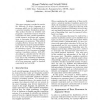Free Online Productivity Tools
i2Speak
i2Symbol
i2OCR
iTex2Img
iWeb2Print
iWeb2Shot
i2Type
iPdf2Split
iPdf2Merge
i2Bopomofo
i2Arabic
i2Style
i2Image
i2PDF
iLatex2Rtf
Sci2ools
114
click to vote
COLING
1996
1996
Anaphora Resolution of Japanese Zero Pronouns with Deictic Reference
This paper proposes a method to resolve the reference of deictic Japanese zero pronouns which can be implemented in a practical machine translation system. This method focuses on semantic and pragmatic constraints such as semantic constraints on cases, modal expressions, verbal semantic attributes and conjunctions to determine the deictic reference of Japanese zero pronouns. This method is highly effective because the volume of knowledge that must be prepared beforehand is not very large and its precision of resolution is good. This method was implemented in the Japanese-to-English machine translation system, ALT-J/E. According to a window test for 175 zero pronouns with deictic referent in a sentence set for the evaluation of Japaneseto-English machine translation systems, all of zero pronouns could be resolved consistently and correctly.
Related Content
| Added | 02 Nov 2010 |
| Updated | 02 Nov 2010 |
| Type | Conference |
| Year | 1996 |
| Where | COLING |
| Authors | Hiromi Nakaiwa, Satoshi Shirai |
Comments (0)

